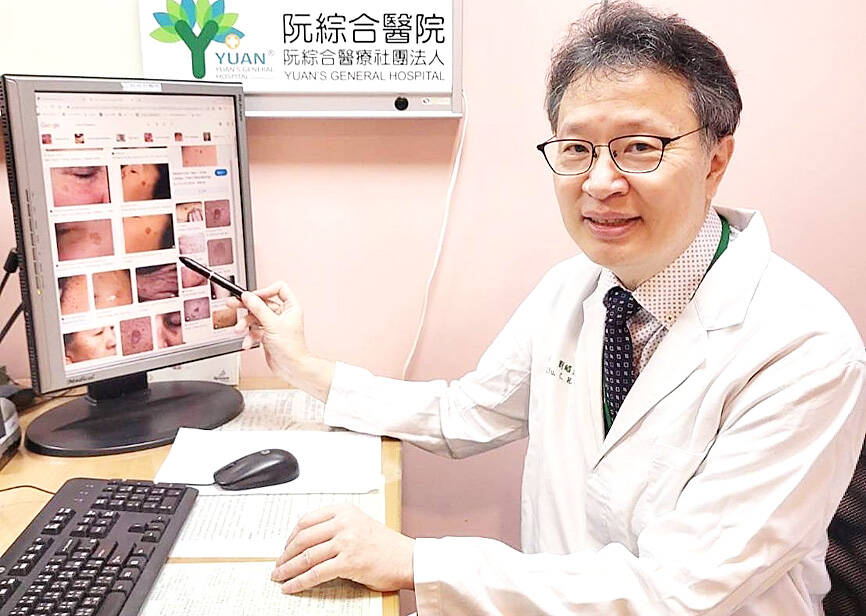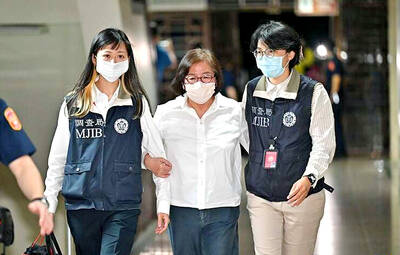A 22-year-old college student, who is an outdoors sports enthusiast, said he had seemingly enlarged facial freckles after traveling to Kenting last summer.
It was later diagnosed as solar lentigo.
The case was cited by Yuan’s General Hospital dermatologist Liu Chao-hung (劉昭宏), who said solar lentigo, also known as age spots, is a collective name for reticulated seborrheic keratosis, benign lichenoid keratosis, pigmented actinic keratosis, sunburn freckles and lentigo maligna, among other skin problems.

Photo courtesy of Yuan’s General Hospital
Solar lentigo results from skin aging and cumulative ultraviolet (UV) exposure, rather than enlarged freckles or virus infection, he said.
Age spots are not exclusive to elderly people and have become more common among people in their 20s, Liu said, adding that they remain most prevalent among people aged 40 and older.
The development of age spots depends on age, physical predisposition and damage from UV exposure, Liu said.
He also called on the public not to believe in advertisements or buy skin care drugs or products to remove age spots.
They can only be treated by laser or therapies such as cryotherapy, electrocauterization and alpha hydroxy acid peeling, Liu said.
The treatment is contingent on the location, number and size of the spots, as well as the personal habits of the affected person, Liu said, adding that laser therapy is recommended, as it selectively disrupts age spots without damaging the surrounding skin tissue and is less likely to leave scars.
Age spots are speckle-shaped at the initial stage, which would gradually turn from brown to black, with sizes ranging from several millimeters to several centimeters, he said.
They are mainly found on body parts prone to sun exposure, such as the face, back of the hand, forearms and chest, he added.
Most age spots are benign patches with clear boundaries and only very few would require a differential diagnosis to distinguish them from malignant melanoma (a type of skin cancer), Liu said.
People should go to the hospital for a biopsy to check for cancer if there is irregular diffusion, localized thickening or localized color change in their age spots, he said.

Costa Rica sent a group of intelligence officials to Taiwan for a short-term training program, the first time the Central American country has done so since the countries ended official diplomatic relations in 2007, a Costa Rican media outlet reported last week. Five officials from the Costa Rican Directorate of Intelligence and Security last month spent 23 days in Taipei undergoing a series of training sessions focused on national security, La Nacion reported on Friday, quoting unnamed sources. The Costa Rican government has not confirmed the report. The Chinese embassy in Costa Rica protested the news, saying in a statement issued the same

Taiwan is to extend its visa-waiver program for Philippine passport holders for another year, starting on Aug. 1, Minister of Foreign Affairs Lin Chia-lung (林佳龍) said on Friday. Lin made the announcement during a reception in Taipei marking the 127th anniversary of Philippine independence and the 50th anniversary of the establishment of the Manila Economic and Cultural Office (MECO) in Taiwan, the Ministry of Foreign Affairs said. The decision reflected Taiwan’s commitment to deepening exchanges with the Philippines, the statement cited Lin as saying, adding that it was a key partner under the New Southbound Policy launched in 2016. Lin also expressed hope

Temperatures in New Taipei City’s Sindian District (新店) climbed past 37°C yesterday, as the Central Weather Administration (CWA) issued heat alerts for 16 municipalities, warning the public of intense heat expected across Taiwan. The hottest location in Taiwan was in Sindian, where the mercury reached 37.5°C at about 2pm, according to CWA data. Taipei’s Shilin District (士林) recorded a temperature of 37.4°C at noon, Taitung County’s Jinfeng Township (金峰) at 12:50 pm logged a temperature of 37.4°C and Miaoli County’s Toufen Township (頭份) reached 36.7°C at 11:40am, the CWA said. The weather agency yesterday issued a yellow level information notice for Taipei, New

CASE: Prosecutors have requested heavy sentences, citing a lack of remorse and the defendants’ role in ‘undermining the country’s democratic foundations’ Five people affiliated with the Chinese Nationalist Party (KMT), including senior staff from the party’s Taipei branch, were indicted yesterday for allegedly forging thousands of signatures to recall two Democratic Progressive Party (DPP) lawmakers. Those indicted include KMT Taipei chapter director Huang Lu Chin-ru (黃呂錦茹), secretary-general Chu Wen-ching (初文卿) and secretary Yao Fu-wen (姚富文), the Taipei District Prosecutors’ Office said in a news release. Prosecutors said the three were responsible for fabricating 5,211 signature forms — 2,537 related to the recall of DPP Legislator Wu Pei-yi (吳沛憶) and 2,674 for DPP Legislator Rosalia Wu (吳思瑤) — with forged entries accounting for